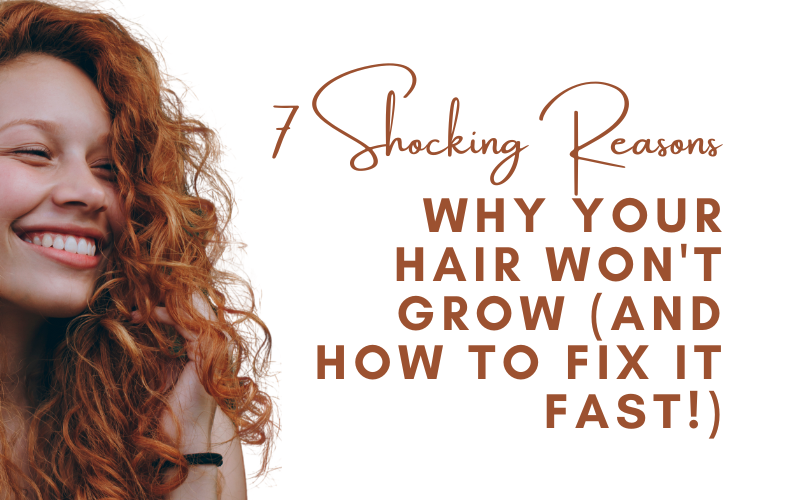Girl, if your hair won’t grow no matter what you try, you’re definitely not alone in this struggle! I’ve been there, staring at my hair in the mirror wondering why it seems stuck at the same length month after month. The truth is, when your hair won’t grow, there’s usually a specific reason (or several reasons) behind it – and once you identify the culprit, you can finally start seeing those gorgeous long locks you’ve been dreaming of.
Let’s dive into the most common reasons why your hair might be giving you the silent treatment and, more importantly, how to fix each one so you can get back to having hair that actually grows!
1. You’re Dealing with Nutrient Deficiencies (The Silent Hair Growth Killer)
One of the biggest reasons why your hair won’t grow is that your body simply doesn’t have the building blocks it needs to create healthy hair. A lack of proper nutrients, including vitamins A, C, D, and E, zinc, B vitamins, iron, biotin, protein, and essential fatty acids, may slow hair growth or cause hair loss.
Think of it this way – your hair follicles are like tiny factories, and they need specific materials to produce hair. When you’re deficient in key nutrients, these factories basically go on strike. The most common culprits include:
- Iron deficiency: This is huge for us ladies, especially if you have heavy periods
- Vitamin D: Vitamin D is essential for creating the cells that develop into hair follicles
- Biotin and B vitamins: These are crucial for hair structure and growth
- Protein: Your hair is literally made of protein, so not getting enough is a recipe for disaster
The fix: Get a blood test to check your nutrient levels, then work with your doctor to address any deficiencies through diet changes and targeted supplements. For more detailed information about nutrition and hair health, check out this comprehensive guide from the International Society of Hair Restoration Surgery.

2. Your Hair Care Routine is Actually Sabotaging Growth
I hate to break it to you, but some of those hair care habits you think are helping might actually be the reason your hair won’t grow past a certain point. Over-processing, excessive heat styling, and using harsh chemicals can cause breakage that makes it seem like your hair has stopped growing entirely.
Here’s what might be sabotaging your length retention:
- Daily heat styling without proper protection
- Chemical treatments too close together (relaxers, perms, color)
- Aggressive brushing, especially when wet
- Using rubber bands or tight elastics that snap hair
The fix: Give your hair a break! Embrace protective styles, use heat protectant religiously, and invest in silk or satin pillowcases and scrunchies. Sometimes the best thing you can do when your hair won’t grow is to simply stop damaging it faster than it can repair itself.

3. Hormonal Imbalances Are Wreaking Havoc
Hormones control so much more than we realize, and they’re often behind the mystery of why your hair won’t grow like it used to. Hair can stop growing or grow slowly for a variety of reasons, including age, genetics, hormones, or stress.
Common hormonal culprits include:
- Thyroid disorders (both hyper and hypothyroid)
- PCOS (polycystic ovary syndrome)
- Postpartum hormone changes
- Menopause and perimenopause
- Birth control side effects
The fix: If you suspect hormones might be why your hair won’t grow, talk to your healthcare provider about getting tested. Many hormonal hair issues can be managed with proper treatment, whether that’s medication, lifestyle changes, or both.
4. Chronic Stress is Literally Stopping Your Hair Growth
Stress isn’t just bad for your mental health – it can be devastating for your hair growth too. When you’re constantly stressed, your body diverts energy away from “non-essential” functions like hair growth to deal with what it perceives as immediate threats.
There are actually different types of stress-related hair loss:
- Telogen effluvium (temporary hair shedding)
- Alopecia areata (patchy hair loss)
- Trichotillomania (hair pulling urges)
The fix: This one’s easier said than done, but managing stress is crucial if your hair won’t grow. Try meditation, regular exercise, adequate sleep, and don’t be afraid to seek professional help if you’re dealing with chronic stress or anxiety. Your hair (and your overall health) will thank you.

5. You’re Not Getting Enough Quality Sleep
When your hair won’t grow, poor sleep might be the sneaky culprit you haven’t considered. During deep sleep, your body produces growth hormone, which is essential for hair growth and repair. If you’re not getting enough quality sleep, you’re literally missing out on prime hair growth time.
Sleep affects hair growth by:
- Disrupting hormone production
- Increasing stress hormones like cortisol
- Reducing blood flow to hair follicles
- Preventing proper cellular repair
The fix: Aim for 7-9 hours of quality sleep nightly. Create a bedtime routine, keep your bedroom cool and dark, and consider using a silk pillowcase to reduce hair friction while you sleep.
6. Your Genetics Are Playing the Long Game
Sometimes, the reason your hair won’t grow past a certain length isn’t actually that it’s not growing – it’s that you’ve reached your genetic hair growth potential. Everyone has a different “terminal length” determined by their genes, and some people naturally have shorter growth phases than others.
Female hair loss (alopecia) affects about one-third of women at some time in their lives; among postmenopausal women, as many as two-thirds suffer hair thinning or bald spots. This shows just how common genetic factors are in hair growth patterns.
The fix: While you can’t change your genetics, you can optimize your hair health to reach your maximum potential. Focus on maintaining healthy hair practices, proper nutrition, and scalp health to ensure your hair grows to its fullest genetic capacity.
7. Scalp Health Issues Are Creating a Poor Growing Environment
Your scalp is like the soil for your hair – if it’s not healthy, your hair won’t grow properly. When your hair won’t grow despite your best efforts, scalp issues might be the hidden problem. Common scalp problems that affect growth include:
- Clogged hair follicles from product buildup
- Dandruff and seborrheic dermatitis
- Scalp infections
- Poor circulation
- Excessive oiliness or dryness
The fix: Incorporate regular scalp care into your routine. Use clarifying shampoos weekly, try scalp massages to improve circulation, and consider using treatments specifically designed for scalp health. If you have persistent scalp issues, see a dermatologist for proper diagnosis and treatment.
The Bottom Line: Your Hair Growth Journey Starts Now
If your hair won’t grow, remember that you’re not doomed to short hair forever! Most hair growth issues are totally fixable once you identify what’s causing the problem. The key is being patient and consistent with your new hair care approach – hair growth takes time, and you might not see results for several months.
Start by addressing the most likely culprits: improve your nutrition, reduce damage from styling, manage stress, and pay attention to your scalp health. If you’re still struggling after a few months of consistent effort, don’t hesitate to consult with a dermatologist or trichologist who can help identify any underlying medical issues.
Remember, healthy hair growth is a marathon, not a sprint. Be kind to yourself and your hair throughout this journey – those long, gorgeous locks are definitely within reach!
For more detailed information about hair loss causes and treatments, check out the Mayo Clinic’s comprehensive guide and Harvard Health’s research on vitamins and hair loss.




